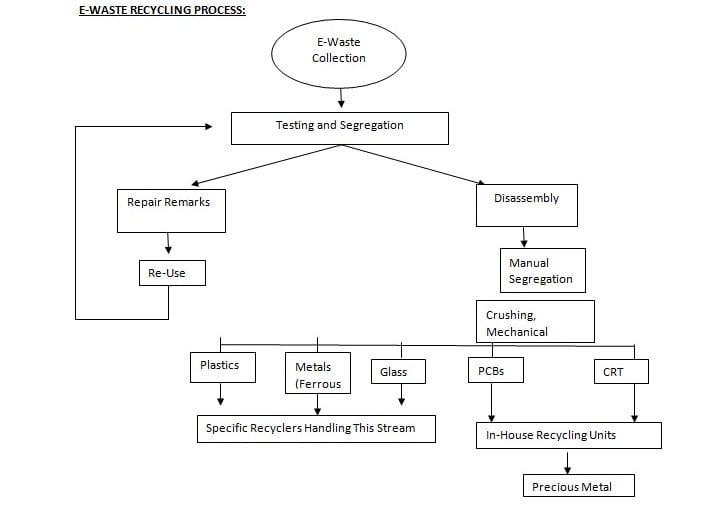WHAT IS RECYCLING
Recycling means recovery & reprocessing of waste material to use in new product. Materials which can be recycled are iron & steel scrap, aluminum cans, glass bottles, wood, plastic & paper which serves as substitute for raw material obtained from scarce natural resources like petroleum, natural gas, mineral ores, coal & trees.
Mainly two types of recycling operations are internal recycling & external recycling. Internal recycling means when the reuse in the manufacturing process of materials that are waste product of that process is done which is common in metal industry. External recycling means reclaiming of material from a product that has been worn out or rendered useless & obsolete.
E-waste is now the fastest-growing waste stream, with computer equipment accounting for about 70% of it, followed by telecommunications (12%), electrical equipment (8%), and medical equipment (2%). (7 per cent).
E-waste, without a doubt, poses a significant environmental threat. It does, however, create enormous opportunity for entrepreneurs prepared to take the risk. According to a recent report by Assocham-Ckinetics, India is the world’s fifth largest e-waste producer, with annual e-waste creation anticipated to increase by 30% to 5.2 million metric tonnes (MT) by 2020, up from the current level of 1.8 million MT.
As a result, the e-waste recycling industry has a big revenue opportunity.
This study gives a quick rundown of the e-waste recycling industry’s criteria.
Importance of E-waste Management
According to the World Health Organization (WHO), when harmful elements leached from E-Waste come into direct contact with humans, animals, or the environment, health concerns and environmental degradation can occur. Lead (Pb), cadmium (Cd), chromium (Cr), and polychlorinated biphenyls (PCBs) are examples of poisonous materials (PCBs). Inhalation of hazardous gases, as well as the accumulation of toxins in soil, water, and food, can cause serious health problems. As a result, tainted water and food will enter the human food chain, with negative consequences.
This contamination endangers not just individuals but also the environment. The risks are particularly high in developing nations because some rich countries send their e-waste to for disposal. However, in light of the dangers of E-Waste, rules have been created that restrict the import and export of E-Waste. It has been discovered that worldwide e-waste has negative consequences not just for those who work with it, but also for those who live in its vicinity.
Due to a lack of understanding about E-Waste, it is difficult to manage it. As a result, a comprehensive recycling process must be implemented to protect us and future generations.
GOVERNMENT BODIES INVOLVED IN E-WASTE MANAGEMENT AUTHORIZATION:
- Central pollution control board
- Ministry of Electronics & Information Technology
- State Board Pollution Board
GOVERNMENT SUBSIDY FOR E-WASTE RECYCLING PLANS:
Is there any subsidy for E waste recycling startup in India? Yes there is a recycling projects. The subsidy is from both the central government as well as state government .The CG gives a subsidy of 25% or equivalent to the state subsidy whichever is lower
